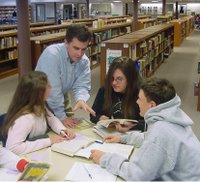Spreadsheets can be very useful in the classroom. Teachers can use a spreadsheet to calculate their students class averages in a very time efficient way. Students can use spreadsheets to make very impressive and professional looking charts and graphs. Also, students can spreadsheets to help with repetitive math assignments.
The website http://www.alicechristie.org/edtech/ss/#articles is a very impressive collection of several examples of how a K-12 teacher could use spreadsheets in the classroom. Dr. Alice Christie developed the web page. She is now a professor at Arizona State, but she taught in K-12 schools for 25 years previous to becoming a professor.
Thursday, June 28, 2007
Tuesday, June 26, 2007
Week 4 Homework Part 2: Using iPods in Instruction
Typically iPods are thought to be a device used to store and play music in the same way a CD player does. IPods are not limited to this use only, since iPods can be used to store any computer files.
Using the iPod attachments that are available, teachers can record their lectures so that they can be available for students to listen to on their iPod. What a great tool that would be for a substitute lesson plan. Even if students in a class did not own a personal iPod, the teacher could leave his iPod, and speakers attachment, with the the substitute so the class could listen to it.
Also, using the iPod could be a great way for teachers to record lectures so that students who are absent could still listen to the lecture. Maybe this is not something that a teacher would want to do regularly, but in certain circumstances. Like if a student who truly wanted to keep up with his studies was hospitalized. Or, if one fourth of the class was going to be absent for a week because the softball team was going to the final playoffs.
Whether using the iPod as a device to deliver lectures to students, or just a storage device, the way iPods are used in instruction is expanding. See the website http://www.principalspartnership.com/iPods.pdf for more information.
Using the iPod attachments that are available, teachers can record their lectures so that they can be available for students to listen to on their iPod. What a great tool that would be for a substitute lesson plan. Even if students in a class did not own a personal iPod, the teacher could leave his iPod, and speakers attachment, with the the substitute so the class could listen to it.
Also, using the iPod could be a great way for teachers to record lectures so that students who are absent could still listen to the lecture. Maybe this is not something that a teacher would want to do regularly, but in certain circumstances. Like if a student who truly wanted to keep up with his studies was hospitalized. Or, if one fourth of the class was going to be absent for a week because the softball team was going to the final playoffs.
Whether using the iPod as a device to deliver lectures to students, or just a storage device, the way iPods are used in instruction is expanding. See the website http://www.principalspartnership.com/iPods.pdf for more information.
Week 4 Homework Part I: Seymour Papert
Seymour Papert has new ideas of how education should be presented to children. Starting from elementary school, he believes that children should not be taught things like fractions, Latin, etc... that are not useful in everyday life. Instead he believes that subjects like mathematics should be presented in a more practical way. For instance, teaching a first grader engineering which will result in the child learning mathematics. See the website http://www.abc.net.au/sundayprofile/stories/s1144341.htm for a great interview with Seymour Papert.
Currently Seymour Papert is recuperating from being struck by a motorbike in December 2006. He was 78 years old when he was in the accident and was seriously injured.
Currently Seymour Papert is recuperating from being struck by a motorbike in December 2006. He was 78 years old when he was in the accident and was seriously injured.
Tuesday, June 19, 2007
Week 3 Homework Part 2: International Schools Using Blogs
The first international example that I found is a blog site for Woodhill Primary School in Bishopbriggs, Scotland. To visit this blog go to http://woodhillprimaryschool.blogspot.com/. The blog site discusses the subjects of French, English, and the environment. It also has an archive of blogs dating from October 2005 to the present. A lot of the student responses are very casual and you can tell it is the first time many of the students have ever blogged before.

The second international example that I found is a blog site for Bucklands Beach Intermediate School in New Zealand. To visit this blog go to http://thediaryofannefrank.blogspot.com/. The blog site is for the year 7 students to discuss the book, The Diary of Anne Frank. The student responses are posted by the teacher after the students discussed portions of the book as a group.


The second international example that I found is a blog site for Bucklands Beach Intermediate School in New Zealand. To visit this blog go to http://thediaryofannefrank.blogspot.com/. The blog site is for the year 7 students to discuss the book, The Diary of Anne Frank. The student responses are posted by the teacher after the students discussed portions of the book as a group.

Week 3 Homework Part 1: U.S. Schools Using Blogs
The first United States example that I found is a blog site for students and parents of a fifth grade classroom in Battle Creek, Michigan. To visit this blog go to http://mrfowler.wordpress.com/about/. The teachers name is Mitch Fowler and he has the following categories in his blog site: character, general, language arts, questions, and science. Most of the students responses to this teachers questions on this blog are very causal. You can tell the teacher tries to make this blog site a fun experience for the students.

The second United States example that I found is a blog site for students of a tenth grade English classroom in Branford, Connecticut. To visit this blog go to http://millersenglish10.blogspot.com/. The teachers name is Mr. Miller and he has links to all of his students blogs in his blog site. The students blog sites discussed the lasted novel they were reading. The students responses were much more formal than Mr. Fowler's blog site.


The second United States example that I found is a blog site for students of a tenth grade English classroom in Branford, Connecticut. To visit this blog go to http://millersenglish10.blogspot.com/. The teachers name is Mr. Miller and he has links to all of his students blogs in his blog site. The students blog sites discussed the lasted novel they were reading. The students responses were much more formal than Mr. Fowler's blog site.

Friday, June 8, 2007
Week 2 Homework: ACCESS
Alabama Connecting Classroom, Educators and Students Statewide (ACCESS) is a program that allows schools to offer classes through the web. The teacher is located at one school, and through the web, teaches students at any other school that is participating in this program.
This program is a great way for schools to expand their advanced placement classes and electives. For example ACCESS could be used to teach calculus at a small school that could not hire a teacher to teach calculus because only a few students wanted to take it. Students will be able to ask questions and talk to their teacher through videoconferencing. Only a monitor is required in the classroom.
This program is a great way for schools to expand their advanced placement classes and electives. For example ACCESS could be used to teach calculus at a small school that could not hire a teacher to teach calculus because only a few students wanted to take it. Students will be able to ask questions and talk to their teacher through videoconferencing. Only a monitor is required in the classroom.
Saturday, June 2, 2007
Week 1 Homework: How I will use ALEX in my classroom.
When I return to teaching high school mathematics, when my children are in elementary school, I will use the Alabama Learning Exchange (ALEX). When I taught high school mathematics in the past, anytime I was assigned a new subject to teach, I always had to hunt down teachers who had taught the class in the past to get a copy of course of study and lesson plan ideas. It doesn't matter which school I get assigned to, or which mathematics class I get assigned to, ALEX is a quick resource to look up the course of study and lesson plans.
I would include ALEX in my course syllabus as a resource to students. ALEX has links to interesting math websites that my students could have fun with in the computer lab. I also saw great project ideas for high school math classes in the lesson plans which I would definitely use because it can be challenging to think of good project ideas for math classes.
I would include ALEX in my course syllabus as a resource to students. ALEX has links to interesting math websites that my students could have fun with in the computer lab. I also saw great project ideas for high school math classes in the lesson plans which I would definitely use because it can be challenging to think of good project ideas for math classes.
Week 1 Homework: ALEX Description
The Alabama Learning Exchange (ALEX) is a great web resource for teachers. Teachers can use ALEX to find great lesson plans. It gives teachers the option of logging in to use a personal workspace. ALEX also links teachers to professional learning resources.
ALEX is also a great web resource for students. It gives students access to the course of study for all subjects from kindergarten through high school. Students can use ALEX to find web sites for a particular subject they are studying. Just like teachers, students can search the ALEX database for information.
ALEX is also a great web resource for students. It gives students access to the course of study for all subjects from kindergarten through high school. Students can use ALEX to find web sites for a particular subject they are studying. Just like teachers, students can search the ALEX database for information.
Subscribe to:
Posts (Atom)
